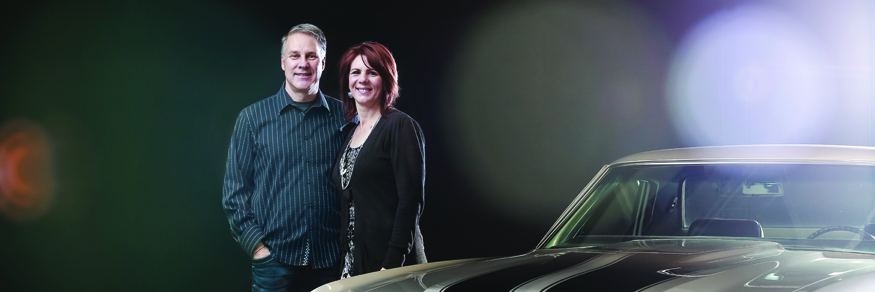Shortly after they married in 1999, Reno Trentini showed his wife, Jane, an old newspaper clipping of a 1967 Chevelle and told her he had always wanted to own one. Jane told him to slip the clipping into his day planner, and it would happen.
Three months later, while stopping for gas, the couple bought a bargain finder magazine. In it, they spotted a striking 1966 Chevelle SS. They went out and bought the car on the spot.
Reno soon went from proud owner to restoration master. He also purchased a 1970 Chevrolet El Camino, which he tirelessly rebuilt over two-and-a-half years, and then took on a 1965 model. The cars were exhibited at a few motor shows before eventually gathering dust in storage.
“For me, the fun was in building them and the creative process.”
“It just hit me one day that it would be such a shame to just sell them and put the money towards other things. Considering all that Reno put into them, we should do something more meaningful,” Jane says.
Jane was diagnosed with Multiple Sclerosis in 1999. Through her work as an estate planner and insurance advisor – helping families establish private foundations and donor funds – she realized they could do something more meaningful, including making a difference for others with M.S.
The Trentinis are now gearing up to auction off their two restored vintage cars in April and donate all the proceeds to charity. Half the sum will go toward the “Whatever It Takes” research fund for the MS Society of Canada; the other half will be invested in an endowment fund with Edmonton Community Foundation (ECF). The donation should prove fairly substantial, with both cars boasting a total appraised value of nearly $350,000. Jane likens the cars to jewels.
“I feel great that someone else is going to be able to experience what I did driving the cars,” Reno says. “I’m not attached to the cars. For me, the fun was in building them and the creative process.”
The Trentinis, who have made smaller donations to charities over the years, hope to turn Reno’s handiwork into a generational legacy. Each year, four per cent of the growing endowment fund – income earned from the investment – will go to charities chosen with input from their three children and seven grandchildren. Some will go to international causes, like sponsoring children, some to local charities, but the heart of the fund will be steady, ongoing support to the MS Society of Canada. That’s especially meaningful to Jane as both her and her younger sister have the autoimmune disease and it took her aunt’s life at the age of 56. Jane is 56 this year.
“I always think it’s pretty amazing when professional advisors in our community walk that walk. They’re not only advisors, but they’re generous donors themselves,” says Kathy Hawkesworth, ECF’s Director of Donor Services, who helped the Trentinis plan their fund. “They understand their motivations for making a difference and then they surprised us with this truly unique way to move forward to make that difference themselves, by transforming Reno’s labour of love in restoring these cars into support that lasts forever. We enjoyed learning from them what they wanted to accomplish and how they wanted to involve their family. With that information, it was a simple process to put together an endowment that reflects their wishes.”
The permanent support created by endowment comes from ECF investing the fund and then each year granting a prudent percentage of the fund (currently four per cent). It doesn’t take very long, in the perpetual life of an endowment (often less than 20 years) for an endowment fund to provide collective support equal to the original gift. At that point, the fund is often vibrant and growing, capable of providing even more support in the future.
As for Reno, he isn’t done restoring cars yet. He’s got his eyes set on a rat rod -and plenty of imagination left.
“Let’s just say I’ve got my toe in the water,” he laughs.
